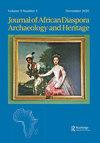将茨瓦纳考古遗址与其后裔重新联系起来:为每个人开发南部非洲文化遗产的挑战
Q1 Arts and Humanities
Journal of African Diaspora Archaeology and Heritage
Pub Date : 2018-09-02
DOI:10.1080/21619441.2018.1537101
引用次数: 2
摘要
摘要:南部非洲的考古学家希望为公众提供参观可见遗址的机会,他们面临着广泛的农场私有化和相关的非洲社区流离失所的挑战。今天的600万茨瓦纳语使用者中,大多数人无法进入他们祖先建造的许多石墙定居点所在的私人农场。博茨瓦纳南部最近的研究在公共土地上发现了一处遗址,该遗址距离能够将其视为其遗产一部分的人很近。2017年,正在筹备将大型石墙之都Makolontwane开发为文化遗产旅游目的地。Makolontwane由讲茨瓦纳语的(Ba)Ngwaketse在18世纪建造,是他们袭击国家的一部分。保护和修复Makolontwane的努力是基于让所有游客都能了解这段历史的愿望,包括那些经常与自己的考古遗产疏远的茨瓦纳语使用者。本文章由计算机程序翻译,如有差异,请以英文原文为准。
Reconnecting Tswana Archaeological Sites with their Descendants: The Challenge of Developing Southern Africa’s Cultural Heritage for Everyone
ABSTRACT Archaeologists in southern Africa who wish to provide public access to visible sites face the challenge of widespread farm privatization and the associated displacement of African communities. Most of today’s six million Tswana speakers cannot access the private farms where many stonewall settlements built by their ancestors are located. Recent research in southern Botswana identified a site on communal land in close proximity to people who can identify it as part of their heritage. In 2017, preparations got underway to develop the large stonewall capital of Makolontwane as a cultural heritage tourism destination. Makolontwane was built by the Tswana-speaking (Ba)Ngwaketse in the eighteenth century as part of their raiding state. Efforts to preserve and restore Makolontwane are grounded in a desire to make such history accessible to all visitors, including Tswana speakers who have been routinely alienated from their own archaeological heritage.
求助全文
通过发布文献求助,成功后即可免费获取论文全文。
去求助
来源期刊

Journal of African Diaspora Archaeology and Heritage
Arts and Humanities-History
CiteScore
0.80
自引率
0.00%
发文量
9
期刊介绍:
Journal of African Diaspora Archaeology and Heritage provides a focal point for peer-reviewed publications in interdisciplinary studies in archaeology, history, material culture, and heritage dynamics concerning African descendant populations and cultures across the globe. The Journal invites articles on broad topics, including the historical processes of culture, economics, gender, power, and racialization operating within and upon African descendant communities. We seek to engage scholarly, professional, and community perspectives on the social dynamics and historical legacies of African descendant cultures and communities worldwide. The Journal publishes research articles and essays that review developments in these interdisciplinary fields.
 求助内容:
求助内容: 应助结果提醒方式:
应助结果提醒方式:


